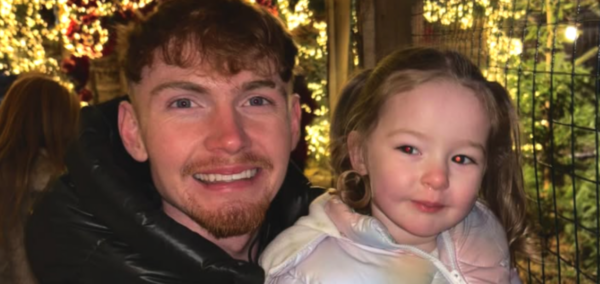
Fresher Jeni Larmour took ketamine on her first night at university – then it killed her
This is her heartbreaking story, according to those who knew her
“Are you alive?” Sandra texts her daughter Jeni at 10:26 am the morning after her first night of university, joking about her hangover. The first night of Freshers’ is supposed to be a night of making friends with your new flatmates and exploring your new city. But Jeni didn’t ever receive that message from her mum. She’d passed out on her flatmate’s bedroom floor after taking a mix of ketamine and alcohol.

Jeni with her mum Sandra, provided by her mother
Jeni Larmour was a fresher starting at Newcastle University in 2020. From Newtownhamilton in County Armagh, Northern Ireland, Jeni was deputy head girl at her school, a member of the choir and cadet force, but also “never missed a party”.
According to her friends, she had a “huge, unmistakable laugh” that was loud and went everywhere. She loved Rihanna, Nicki Minaj and was wearing Docs and Buffalos way before people our age considered them cool. She decided to study architecture and urban planning after visiting India on a charity trip. “She wasn’t just happy with change in Northern Ireland, she wanted to change the world,” her mum tells me.
It’s been four years since Jeni’s death when I speak to Sandra on the phone, and she still sounds shaken about the events of that night. She has been campaigning for justice for her daughter and visiting schools and universities to speak about the dangers of drugs, but it’s clear this conversation still isn’t easy for her. By now, Jeni would have graduated uni and would be entering the next phase of life as a grad.
Most Read
“We should have been looking forward to the future, you know, her getting married, me having grandchildren, all of those things. Her dreams were dashed, but my dreams have been dashed too,” Sandra said.

Jeni Larmour on her 18th birthday, provided by her mother
On the day before it happened, Jeni and Sandra left their rural home, where their nearest neighbour is a number of miles away, and boarded a flight to Newcastle. Realising they could only take one bag each on the plane, Jeni had to repack her entire bag on the airport floor, something which made Sandra “one thousand per cent sure” the drugs Jeni took the following night couldn’t have been her own. They got settled and that night sat on the bed of their Premier Inn and watched a film.
On Friday morning, they went out for breakfast at Olive and Bean cafe where Jeni had Eggs Royale, before shopping for her uni flat – buying kitchen utensils and decorations for her halls bedroom. Jeni was staying in Park View Halls, one of the fancier accommodations, where students can expect to have a good time. At £178.50 a week, the rooms have en-suite bathrooms and three-quarter beds, and flats are shared between eight people.

Park View Halls (Via YouTube)
They did a food shop and headed there at around 4:40pm when Sandra left her. Jeni put her food shop away, had a shower, redid her makeup, complete with her signature winged eyeliner and bold eyeshadow, and headed to the kitchen for pre-drinks.

Park View Halls interior (Via YouTube)
Jeni’s new flatmate Kavir Kalliecharan from Leeds, who would later be implicated in her death, described the mood as “happy”. “Everyone was excited to get to know each other,” he told a court. He drank three pint glasses of vodka and mixer and a shot of Sambuca before leaving the flat.
“I was drunk,” he said. “They all seemed drunk as well.” They had a table booked at The Points Irish bar in Newcastle city centre for 7pm. It was the Covid year at university, with clubs shut and a 10 pm curfew. But Jeni was denied entry to the bar, having forgotten her ID. This “showed her naivety,” Sandra said, since she hadn’t previously been out very much.
She has no doubt her daughter “would have been doing vodka shots”, but that is where the line would have been.

The Points bar which Jeni tried to enter the night she died (Via Instagram)
So Kavir and Jeni got a taxi back to Park View planning to grab her ID and head back out. It was at this point Jeni took the drugs that would end her life.
“Later that evening, while her judgement was impaired due to alcohol, Jeni took a quantity of ketamine provided for her by another, the combined effects of which led to her death,” coroner Karen Dilks told the Newcastle court.

Text messages sent from Sandra to Jeni on the night of and morning after her death
But Kavir denied supplying the drugs, insisting Jeni had brought “two small zip bags” to his room after he went to the toilet while she fetched her ID. Jeni’s family has always disputed this.
The inquest heard that Jeni filmed a Snapchat video showing her and Kavir in his room with three lines of white powder on a table. It was not played in open court but was seen by witnesses. The video showed him saying “this is how we do it in England” before snorting the ket.
He told the court he sniffed a line by covering a nostril and immediately felt dizzy and went to the toilet to vomit. This is also around the time Jeni sniffed the drugs. According to Sandra and the version of events presented in court, Jeni keeled over on Kavir’s bedroom floor, face down.

A selfie of Jeni, provided by her mother
The rest of Jeni’s flatmates came back to the flat shortly after 10pm, due to the Covid curfew. At least two other girls saw Jeni lying on the floor at this point. “Then they all went to bed and left Jeni lying on her mouth and nose,” Sandra said. ‘One of the girls who saw Jeni passed out had just started studying for a medicine degree,” she added.
Kavir said he then remembered throwing up and passing out in the bathroom.
At 10:06pm that night, when Jeni was lying face down on the grey carpet of Kavir’s bedroom, Sandra described an “uneasy feeling” leading her to text Jeni asking “All ok?”. When she received no reply she told herself to stop panicking and go to bed; that it was her first night at university and there would be other nights when she’d be out and she wouldn’t be there.
“I know now looking back that it was just mothers’ intuition telling me that something wasn’t right”.
‘It’s my fault, I killed her. I gave her too much’
At 5am, Kavir woke up and found Jeni still face down on his bedroom floor. By this time, rigor mortis had begun to set in. He woke their other flatmates and they congregated in his room as they Googled “What is ketamine?” and “What is a k-hole”.
As another flatmate called the ambulance, Kavir said: “It’s my fault, I killed her. I gave her too much,” the court heard. The ambulance arrived shortly before 6am but the paramedics made no attempt to resuscitate Jeni as “fixed discolouration” indicated she had been dead for a number of hours.

Incident report of Jeni’s death, provided by her mother
When later asked in court what he meant by it being his “fault”, Kavir replied: “Guilt”. Not in a criminal sense, he explained but “moral responsibility”.
Jeni was confirmed dead at 5:59am, with a forensic pathologist revealing in court she was 2.5 times over the drink driving limit and had a “high” amount of ketamine in her blood at the time of her death. Dr Nigel Cooper told the inquest that 197mg of alcohol and 1.3mg of ketamine was present which he described as “high” but “below the range of values where death has been caused by ketamine alone.” He said the effects of the drug were likely exaggerated by alcohol, which combined, would have depressed Jeni’s central nervous system.

The Coroners Report into Jeni’s death, provided by her mother
“Ketamine alone would probably not have caused her death,” Dr Cooper said.
‘My heart started pounding out of my chest’
It was 10:26am the next morning when Sandra texted Jeni asking: “Are you alive?” a joking dig referring to her partying the night before. Jeni was always an early riser. Even when she’d been out the night before, she was always up and out. So at half nine, Sandra began to pace the floor of her Premier Inn, just 1.7 miles from where her daughter was found.
Then at 11am, she received a phone call from the police. They told her to stay in her room and they were coming to the hotel to speak to her. “In my heart I just knew. It was one of those realisations that I was like ‘they are coming to tell me something terrible here'”.
20 minutes later the police arrived at her hotel room. “I just opened the door and I just knew by the look on their faces what they were going to tell me. I just said ‘Don’t tell me, don’t say it’.”
But the police had to inform her that her daughter Jeni had passed away that night. They told her they suspected drugs were involved. “My heart started pounding out of my chest. It was just the most horrendous moment for any parent to go through. Your body then just goes into a state of shock”
“They told me there was a suspicion ketamine was involved – ketamine and alcohol mixed – and I was just thinking, ‘What on earth is ketamine?’ I had to go and Google it.”
The Tab’s drugs survey of 6,000 university students earlier this year found 18 per cent of students who take drugs say they are addicted to ketamine. Home Office figures from the National Crime Survey in December last year show ket is the country’s fourth most popular drug – taken by 303,000 last year. The majority of ketamine users were aged between 16 to 24.
‘There’s just a complete hole in our family’
Speaking about the impact of Jeni’s death, Sandra says: “There’s just a complete hole in our family,” as her voice breaks.
“Yes Jeni would have been at university, but now she would have finished university so there’s all her hopes and dreams but it was also the noise in the house, there’s just me and my son in the house now, everything is quiet. And she’s obviously not back home from university. Then you’ve got the rest of her friends who have been impacted but you can see them moving on with their lives, even if it’s only photos on Facebook of people going on holidays or somebody going on a night out. It’s like she should have been there, she should have been enjoying that.”
“She just had friends everywhere.”

Jeni at her school prom, provided by her mother
‘I would do the pain of it all a 100 times over if it meant I always would have that friendship with Jeni’
Jeni’s best friend Phoebe is just finishing up her final year assessments at the University of Exeter when I speak to her. The pair met whilst working at an international summer school at Gordonstoun in Scotland in the summer of 2019. She fondly described the two of them going from “strangers to best friends in about four weeks”.
The two kept in touch following the summer school, which Phoebe described as “the start of something much bigger,” taking turns in visiting each other and spending events like results day and 18th birthdays with one another.
But two weeks into her own uni experience at Exeter, Phoebe describes waking up at around two in the afternoon, having stayed up all night with her flatmates the night before, and receiving a text from a mutual friend of hers and Jeni’s. The friend was asking if she’d heard from Jeni that day as a rumour had been going around about her overdosing.
“I just kind of knew,” Phoebe said. “You’re really hanging on to some kind of hope that it’s not that but I just had a sick feeling.” She then had a phone call from the friend who confirmed the tragic news Jeni had passed away that morning.
“You just kind of freeze in that moment,” Phoebe told The Tab. “There were no words and there are still few words for it. Your world just falls apart. It’s one of those things where you think it doesn’t happen to people like you or people you know, let alone people you love, it’s just something you see on the news but the nature of what happened doesn’t discriminate, it could happen to anybody.”
Speaking about Jeni’s memory, Phoebe fondly remembers: “She was just awesome. She was effortlessly funny, just so witty and then she had this super gentle, soft and nurturing side to her. She was the first person you’d want to ring with your most exciting news and she’d be the first person you could ring if you had awful news.
“She had this huge unmistakable laugh and it was just the soundtrack to the best summers of my life.”

Jeni and her best friend Phoebe, provided by Phoebe
Phoebe shared how she now keeps a list of things in her phone Jeni has missed that she would have really loved. “I think she would have loved a cargo skirt,” she said “as those weren’t really around at the time. She loved Peggy Gou as well and obviously, her song (It Goes Like) Nanana blew up last year and all I could think about was her. Just stupid things like Rihanna’s halftime show at the Super Bowl, she would have loved that, she loved Rihanna.
“She was some woman for one woman and she was so dedicated to the things she believed in and whether that was a social justice thing or where we should go for the best night out. She never missed a party and she hasn’t in spirit when we’re all together you can’t help but talk about her because she was just the life and soul of everything she was involved in.
“I would do the pain of it all a 100 times over if it meant I always would have that friendship with Jeni.”
‘Today I leave this court feeling in pain, knowing my daughter has been vindicated’
It was two years after Jeni’s death that the inquest concluded on the 12th October 2022.
After police searched his room, Kavir Kalliecharan was charged with possession of drugs and was sentenced to two years on conditional discharge after pleading guilty to possessing but not supplying MDMA, ketamine and cannabis.
He received a conditional discharge, meaning he was released from court with only a criminal record, but upon committing another crime, he would be sentenced for the original and new offence. He was also ordered to pay £85 in costs and a £21 victim surcharge, a penalty given to people convicted of offences in order to provide compensation to the victim.

Inquest statement from Jeni’s family, provided by her mother
Despite the coroner’s finding that the drugs Jeni took were “provided to her by another,” Kavir repeatedly denied the ketamine Jeni took that night was his.
“I’ve had no justice whatsoever,” she said. “I’ve probably spent time that I should have been spent grieving fighting for justice and getting nowhere.” Neither Kavir nor his family offered any condolences to Sandra throughout the entire inquest process, she tells me.
Speaking outside the court after the inquest in October 2022, Sandra said she felt Jeni had been vindicated.“Today I leave this court feeling in pain, knowing my daughter has been vindicated. I had to hear outright lies told about my daughter. I’ve had to hear that the substance that killed Jeni was her own and that she wilfully engaged in supplying these drugs to others. I’ve always known this couldn’t be further from the truth, particularly given the fact that just a few hours earlier Jeni had boarded a plane with me from Belfast to Newcastle, meaning she could never have taken those drugs with her.”
Fleshing out the timeline in conversation with me, Sandra also said it would have been impossible for Jeni to source the drugs once she had arrived in Newcastle.

Sandra speaking outside the inquest (Via YouTube)
“My Jeni was talented. She was most known for her infectious laugh. Everyone who knows Jeni says ‘that laugh’. It was loud, it went everywhere. She was always laughing. We had a very close relationship, she was my best friend. Jeni was much loved. She had a huge following of friends and a lot of people are looking out for her here and in Northern Ireland. The coroner’s acknowledgement that the drugs were provided to her by another or in other words, not her own is of comfort to us. Getting out to her friends and the community of Northern Ireland that she was innocent in all of this.”
The Coroners court also heard from Lucy Backhurst, academic registrar and director of student services at Newcastle University who said Jeni’s application showed she was bright and able, exactly the kind of student they wanted to study there. Speaking to The Tab, Lucy Backhurst added: “Jeni was clearly an outstanding student with a bright future ahead of her and we are incredibly sad she never got the opportunity to start her academic journey with us. We work hard to raise awareness of the dangers of drug and alcohol use with our students and have a range of services and resources to support those affected by their own use or that of someone they know.
“We continue to work closely with our students and the Students’ Union to enhance the services and support we provide. Since Jeni’s death, we have further developed our harm reduction stance on student drug and alcohol use and have introduced additional educational material that we require students to view at the start of their studies.
“We really value the relationship we have developed with Jeni’s mum over the years, who has worked with us on producing a video and related material to warn students about the dangers of drug and alcohol use, and we continue to engage with the police and our city partners to educate and support our students. Once again, on behalf of us all at Newcastle University, our thoughts continue to be with Jeni’s family and friends.”
‘I am horrified that ketamine is a class B drug’
Sandra now visits schools and universities telling Jeni’s story. “I normally just tell Jeni’s story and they can take from that what they want,” she said. “You know my bottom line is don’t take drugs, don’t mix alcohol and drugs. And alcohol is just as bad because had Jeni not been drunk that night she would have known not to take ketamine. So limit your alcohol, always be aware of your surroundings, be aware of who you’re with, be with people you can trust and, you know, bottom line, don’t do drugs. But if you find yourself in a situation or if you’re tempted to do drugs just make sure you’re with people you know and trust.”
Ket is currently a class B drug in the UK, something which Sandra says she is “horrified” at.
“Cannabis, which is minuscule, is also class B as I understand. But in the scale of things ketamine is a killer and it’s something a lot of kids are becoming hooked on. So for it to be classed as a class B drug is just unacceptable.”

Jeni in the Combined Cadets Force, provided by her mother
Following Jeni’s death and three other student deaths in Newcastle that weekend alone, Northumbria Police began Operation Shakespeare which aimed to tackle the supply of drugs in Newcastle. Three men were arrested after being found to be a three-man gang supplying cocaine and ketamine in Newcastle city centre and Jesmond.
Deborah Smithies, prosecuting, said: “In October 2020 Northumbria Police began Operation Shakespeare to tackle the supply of drugs in the Newcastle area. The operation was focused on the supply of drugs to students in Newcastle.
“That had been a priority for the police for some time and came into sharper focus following the deaths of three students in the city as a result of drug use. So an undercover officer was deployed in Newcastle on a number of occasions to purchase drugs.”
‘I feel guilty that I’m living and she’s not’

A poem written for Jeni’s 21st birthday, provided by her mother
For Sandra, she says she can only take it one day at a time going forward after Jeni’s death. “Somebody asked me one day recently ‘what do you want in a few years time, where do you see your life going?’, and I said honestly since Jeni died I just live a day at a time, I don’t look forward to tomorrow at any stage.
Jeni would now be 22 if she’d lived. “Jeni was just a bright spark in life”, says Sandra.
“I feel guilty that I’m living and she’s not.”

Jeni and a friend, provided by her mother
WithYou is a charity that offers free, confidential support to people in England and Scotland who have struggled with drugs alcohol or mental health. Jennifer Rushworth-Claeys, Director of Service for Young People at WithYou told The Tab: “Ketamine has been found to cause permanent damage to the body, changes in mental health, memory, and damage to the nose, liver and kidneys. WithYou is supporting young people who no longer have control of their bladders as a result of ketamine use. This is likely to significantly impact their bodies for the rest of their lives.
“There is particular danger to mixing ketamine with alcohol. This combination has been found to significantly increase the risk of vomiting, slowed breathing, coma, and death in the short term – as well as memory loss and irreversible bladder problems in the long term. If taken together it’s harder to know how each substance is affecting you due to combined intoxication.
“There is no safe way to take ketamine, but there are ways which carry less risk. This includes:
• Not using ketamine if you’re on your own or if you’re in a position where there is nobody you could call for help. A buddy system – where one person takes their hit first and waits until the peak effects have worn off before the other person uses – makes it more likely that someone can help if anyone overdoses.
• Not mixing ketamine with other drugs or alcohol, as this can increase your risk of harm and overdose, even at low amounts.
• Starting with a small amount and waiting before your next dose, as strength can vary between batches.
• Planning and measuring your doses – if you’re going out, only take with you what you plan to use. Take a screenshot of the time or set a timer on your phone each time you have a dose to help you to space out your doses.
“If you are worried about your drug use – or that of a loved one – you can access free, confidential support through our webchat service. Visit wearewithyou.org.uk to find out more.”
The Tab contacted Kavir Kalliecharan’s legal representative several times throughout this process who declined to comment.


















